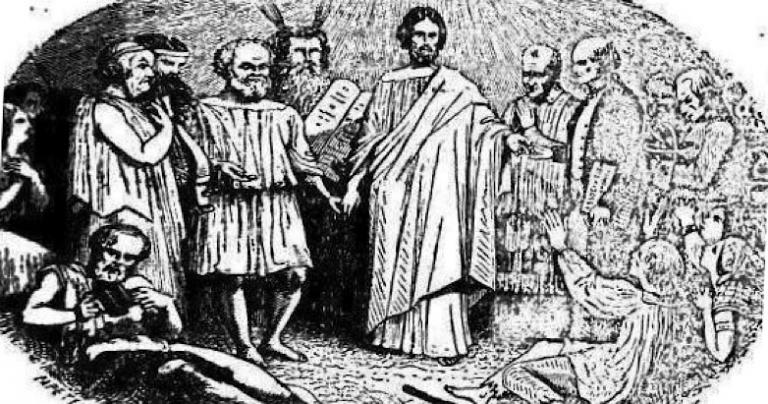
I just read of a leader who is tired of hearing about justice issues. “Didn’t we discuss them already? Shouldn’t we move on?”
That’s impossible if we love justice.
We need to pursue justice and act with mercy again and again. As a result, we must discuss justice and mercy again and again.
Let’s be practical: How can we be just, with mercy, in this particular situation? To be just, we must learn how in the just now to apply Justice (the eternal Idea) to the specific situation we face.
We can know Justice, but not how to be just, because circumstances are always changing. As a result of these changes, we must return to discussion again and again. Discussion that includes God’s revelation, the ideas of great sages, and our neighbors will help us implement justice. We are not discussing for the sake of talking, but talking for the sake of doing.
For a Christian or any person who accepts the reality that an unchanging, objective morality exists, there is an advantage in knowing that justice is and is not going any place. This is good, accepting reality is always good, but not enough. Our work has just begun: finding we have a tool, even knowing generally how to use it, does not mean knowing how best to deploy that tool now.
I once knew a student who brought his Bible to class and would use an index, this was before ebooks, to answer any question. If I asked: “What is justice?” He would look the word up, find the answer, and think we were done with discussion. In a Christian context, there was wisdom to looking at the Bible: start with Revelation and see what God has said. However, this student failed to realize that applying what he saw in the text to what we were discussing is hard. Complicating matters further, the texts he found were often a particular application of the Truth to a specific historic situation described in the text.
Moral laws such as “Do not murder” do not change. Society changes. Our ability to understand the moral laws changes. Justice is an unchanging reality that must be applied in a changing world. The best way forward is to learn all we can about what does not change, Justice, and see, again and again, how this idea plays out in history.
Socrates’ best student, Glaucon, gives us the continuing project:
What I desire most, Socrates, is to hear someone praise justice for its own sake, and you are the one most likely to do so. Thus my purpose in praising the unjust life is to provoke a response from you that will effectively repudiate injustice and vindicate justice. Does my proposal please you?
Socrates’ response to Glaucon rebukes all of us when we grow weary of justice talk:
What else could please me more? This is the one subject, more than any other, that a man of sensibility will choose to discuss-and delight in returning to the discussion again and again.
We begin in praise of justice. Why? What good is praising an idea? The idea does not feel better or need our praise! We need to praise justice, because justice is praiseworthy. The appropriate response to goodness is praise. If we learn to praise the good, then we will learn to want more of the good. We love what we praise, if the praise is sincere.
Socrates can sincerely praise justice, because he wishes to know and possess justice. He instinctively hates injustice like any good man will. The trick, and it is a hard one, is to praise justice in a way that is effective. Effective praise of justice will make people want to be just. Thrasymachus, a sophist, has planted seeds of doubt that suggest injustice may be better than justice. He has praised injustice. The most effective praise of justice will be a demonstration that justice is good for the soul regardless of what happens to the soul externally.
Recall that Plato is writing this passage of Republic after the death of Socrates. Plato’s teacher was martyred in an act of injustice by Athenian democracy, but (see Phaedo), Socrates is happy to the end. Who better to make the case for justice in this book, than the man who died just? If he cannot do it, then nobody then living could.
Socrates loves justice and if he has not yet (at this point in Republic) been able to defend justice to the satisfaction of Glaucon, he is delighted to try again. Why? The lover is always happy to praise the beloved! Getting the lover to stop talking up the wonders of the beloved is harder than getting him to speak!
And so Socrates reminds us that applying justice in a changing world will not be an onerous task for us. We get to come back to the discussion of justice again and again. If we love justice, and if we see Justice, how can we not love her, then we will be delighted to return to a discussion again and again.
As always, God has made the world such that if all were as God made it, our work would all be delightful. Let’s aspire to be people who love justice so much that a chance to apply it to society is not onerous to us, but delightful.
Lord Jesus Christ, son of God, have mercy on me a sinner.
———————————————-
*I begin an informal summer reading of Republic using Scott/Sterling (a new translation for me). Part 1. Part 2. Part 3. Part 4. Part 5. Part 6. Part 7. Part 8. Part 9. Part 10. Part 11. Part 12. Part 13. Part 14. Part 15. Part 16. Part 17. Part 18. Part 19. Part 20. Part 21. Part 22. Part 23. Part 24. Part 25. Part 26. Part 27. Part 28. Part 29. Part 30. Part 31. Part 32. Part 33. Part 34. Part 35. Part 36. Part 37. Part 38. Part 39. Part 40. Part 41. Part 42. Part 43. Part 44. Part 45. Part 45.5. Part 46. Part 47. Part 48. Part 49. Part 50. Part 51. Part 52. Part 52.5. Part 53. Part 54. Part 55. Part 56. Part 57. Part 58. Part 59. Part 60. Part 61. Part 62. Part 63. Part 64. Part 65. Part 66. Part 67. Part 68. Part 69. Part 70.

















